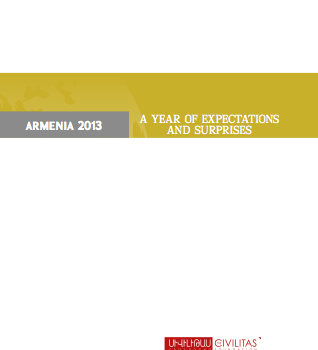
 This is the sixth year that the Civilitas Foundation publishes its annual report. We look back at the past year and attempt to assess and analyze Armenia’s foreign policy, domestic developments and trends, as well as the economic situation in the country – all within the context of a changing global and regional environment.
This is the sixth year that the Civilitas Foundation publishes its annual report. We look back at the past year and attempt to assess and analyze Armenia’s foreign policy, domestic developments and trends, as well as the economic situation in the country – all within the context of a changing global and regional environment.
In a year with two elections – presidential and Yerevan municipal – hopes and expectations were high that this time, something would be different, and the elections would be perceived as legitimate, regardless of who came out on top. After all, in the absence of a strong opposition candidate, it was reasonable to expect that there would not be a need to utilize administrative resources to guarantee a re-election. This expectation was not met, but there was a surprise – the opposition candidate received more than one-third of the vote and that was sufficient for the public to want and expect a different outcome. It did not happen.
The international community, and Armenia’s own citizens, expected that Armenia would continue on the path it had chosen nearly two decades ago – to more deeply integrate within European institutions. Yet, at the last minute, in what could only be described as a surprise to all, Armenia’s president chose to take Armenia into the Russian-led Customs Union. The eternal question, Russia or the West, seemed to have found its answer. If in the past, Armenia had been able to sustain normal and pragmatic relations with all three geopolitical centers — Moscow, Brussels and Washington — and balance their interests to Armenia’s benefit, that was no longer to be expected. In the eyes of a surprised West, and an expectant Russia, Armenia was no longer a predictable and reliable partner.
In 2013, the poor and the unemployed expected some improvement in their lives. The president had promised seven percent growth. It was not a surprise that that goal was not achieved, nor was it a surprise that no one was held accountable.
Opinion polls show that, given the opportunity, hundreds of thousands of Armenians would leave Armenia. Official statistics confirm this. In the first nine months of 2013, more than 120,000 people left and have not returned. During the last six years, on the current government’s watch, every tenth citizen has left the country, either temporarily or forever.
There is no indication that, in the coming year, expectations ought to be different. There is no policy in place to decrease the levels of poverty or unemployment, or to try to halt emigration or encourage in-migration. Neither Armenia-Turkey relations nor the Karabakh conflict expect to be resolved. Relations with Georgia are not expected to markedly change. If there are surprises, they will be in the realm of domestic politics. More active civic engagement, the formation of a more resolute opposition, and a more varied set of demands of the authorities – these are the surprises many hope for.
